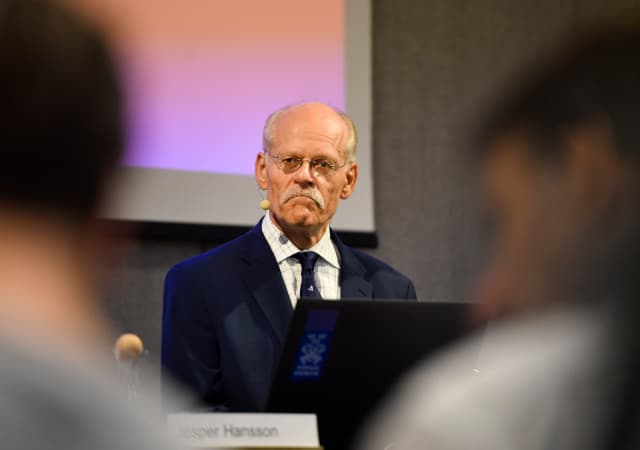Sweden's central bank keeps interest rate low amid trade conflicts and Brexit uncertainty

Sweden's central bank said on Thursday that its interest rate, which has stayed below a historic zero since the beginning of 2015, will remain unchanged for now amid global uncertainty.
"GDP growth abroad, which has been strong for several years, has now slowed and is expected in the coming years to be approximately in line with a historical average," said the Riksbank in a statement.
The bank said it would stick with plans announced in July to raise the country's key interest rate, the repo, later this year. However, it also downplayed future expectations, and said it would raise the repo rate at a slower rate than previously predicted, with only a modest hike from -0.25 to -0.23 percent up ahead.
"During the year (...) sentiment has worsened, due in part to the trade conflict between the United States and China and the uncertainty surrounding the United Kingdom's exit from the EU," it said. "Market rates have fallen substantially and inflation expectations have also fallen, above all in the euro area."
READ ALSO: What the weak Swedish krona means for international workers
Sweden's weak krona got a boost from the announcement, with the currency growing 0.06-0.07 kronor against both the euro and the dollar on Thursday. Many observers had expected the Riksbank to completely abandon plans to raise the repo rate this year, as the rate of inflation is generally predicted to remain low.
READ ALSO: How Sweden's cost of living compares to the rest of Europe
The bank first took the landmark decision to slash the rate below zero in February 2015, hoping that the strategy would boost inflation to raise the price of everyday goods and services which had been stagnant in recent years, and therefore improve the Nordic nation's economic prospects.
It raised it from a record -0.50 to -0.25 in December last year as the inflation rate approached the target two percent, but it has since remained unchanged. The bank said it planned to raise it above zero in 2020.
Read the full Riksbank report here.
Comments
See Also
"GDP growth abroad, which has been strong for several years, has now slowed and is expected in the coming years to be approximately in line with a historical average," said the Riksbank in a statement.
The bank said it would stick with plans announced in July to raise the country's key interest rate, the repo, later this year. However, it also downplayed future expectations, and said it would raise the repo rate at a slower rate than previously predicted, with only a modest hike from -0.25 to -0.23 percent up ahead.
"During the year (...) sentiment has worsened, due in part to the trade conflict between the United States and China and the uncertainty surrounding the United Kingdom's exit from the EU," it said. "Market rates have fallen substantially and inflation expectations have also fallen, above all in the euro area."
READ ALSO: What the weak Swedish krona means for international workers
Sweden's weak krona got a boost from the announcement, with the currency growing 0.06-0.07 kronor against both the euro and the dollar on Thursday. Many observers had expected the Riksbank to completely abandon plans to raise the repo rate this year, as the rate of inflation is generally predicted to remain low.
READ ALSO: How Sweden's cost of living compares to the rest of Europe
The bank first took the landmark decision to slash the rate below zero in February 2015, hoping that the strategy would boost inflation to raise the price of everyday goods and services which had been stagnant in recent years, and therefore improve the Nordic nation's economic prospects.
It raised it from a record -0.50 to -0.25 in December last year as the inflation rate approached the target two percent, but it has since remained unchanged. The bank said it planned to raise it above zero in 2020.
Read the full Riksbank report here.
Join the conversation in our comments section below. Share your own views and experience and if you have a question or suggestion for our journalists then email us at [email protected].
Please keep comments civil, constructive and on topic – and make sure to read our terms of use before getting involved.
Please log in here to leave a comment.